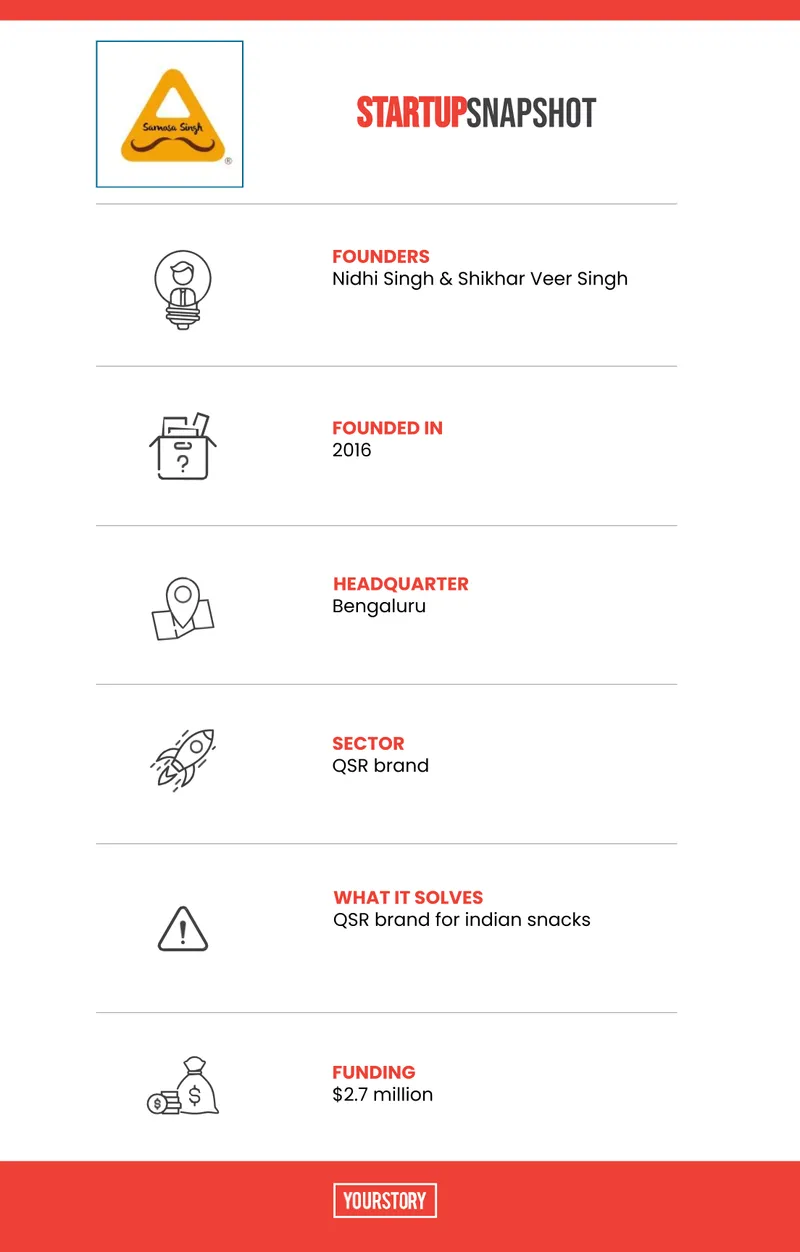Samosa Singh wants to be your 2 AM best friend for snack cravings
Over the next one and a half years, Bengaluru-based QSR snack startup Samosa Singh plans to open in around 250 locations across 30 cities.
Few snacks can satisfy an attack of the midnight munchies like Indian street food. However, finding a decent outlet—one that doesn’t serve two-day-old samosas and tasteless, lukewarm chaats— late at night is next to impossible.
This is one of the problems that QSR (quick-service restaurant) startup Samosa Singh is trying to fix. The startup, which claims to have perfected the art and science of making samosas that stay crisp even when re-heated, is experimenting with late-night snack service.
Bengaluru-based was launched in 2016 by spouses Nidhi and Shikhar Veer Singh.
According to Nidhi, orders for lighter snacks like dahi samosa chaat, bhalla papdi chaat and masala corn samosas peak between 11 PM and 2 AM.
“One day we got a call from one of the restaurant aggregators saying we were losing business by closing our outlets early. We saw that a number of people searched for chholey samosas or dry samosas. We started keeping nine outlets across Bengaluru and Hyderabad open till 2 AM and recovered the additional spends within a week’s time,” Nidhi tells Yourstory.
The startup, which started its late-night snack service experiment three months ago, now has 40 stores running until 2 AM. Coinciding with the current IPL season, the stores are open across Bengaluru, Hyderabad, Chennai, and Mumbai.
Its cart has also grown bigger, between 2.3 and 2.4 variants including platter and other items for late-night orders as compared to 1.8 to 2 variants ordered during the usual hours.
The startup says it is proud of its samosas.
“If you want a samosa to stay crispy for a long time till it reaches home – you have to be very careful about the kind of maida you use. What is the porosity, moisture content, how long to rest the kneaded dough – all these are critical aspects,” says Nidhi, adding that the basic know-how has helped them improve their product over time.
Growth despite pandemic
Samosa Singh started out with a business-to-business offering, catering mostly to the aviation sector, multiplexes such as PVR, Cafe Coffee Day, and others. This led to their flagship samosas being built to retain their texture even after being reheated in a microwave.
However, the COVID-19 pandemic changed the mix of business as well as plans for expansion.
Among other sectors, the pandemic hit aviation, multiplexes, and cafes, wiping out about 80 percent of Samosa Singh’s revenues overnight.
“Our revenues hit zero and the next day we were trying to get all the approvals in place to make sure that we are included under food which was an essential category. We showed a lot of resilience as a brand,” says Nidhi.
This is when the startup's cloud kitchen model took off. To offset costs due to reduced sales, Samosa Singh moved production in-house.
“Samosa-paav is a common item and we used to source the bread. I got my oven from home and started making it at the factory, till we bought a larger setup. We also started making the chutney and gulab jamun which we sold under our brand in-house," the co-founder says.
This helped the startup cushion the impact of the pandemic on its bottom-line and even manage the supply chain challenges.
Roadmap ahead
Despite the challenges, the startup says it has seen Hyderabad and Bengaluru turn in profits at a city level. The Average Order Value has also increased after the pandemic, Nidhi says, adding that it has grown from Rs 180 on an average to nearly Rs 340 as of date.
To serve larger orders, the startup has added new variants such as kachori, kulcha, chaat among other snacks and has also redesigned its platter to a bucket for easier transport.
Samosa Singh says it is in talks to raise a new round of funding to fuel expansion pan-India with a focus on northern markets including Haryana, Delhi and Punjab. It is also aggressively targeting Tier II and III cities and is in conversation with strategic players to take the brand international.
“The Tier II and III cities do very well for us as the women tend to make meals at home and snacks are outsourced. Our outlets in Vizag, Vijayawada, Nashik and Mysore have taken less than four months to break-even,” says Nidhi. She adds that on an average, an outlet can take up to 10 months to break even.

Startup Snapshot of Samosa Singh
Over the next year and a half, Samosa Singh plans to open in around 250 locations across 30 new cities and is also looking into export partnerships.
The startup claims to have seen a growth of 8X over the last year and expects to close FY 2022-23 at revenue run-rate of Rs 40 crore. It has also partnered with Rebel Foods to rent out cloud kitchen space to cater to new locations.
Apart from stalls and restaurants selling Indian street food, the startup competes with new D2C (Direct-to-Consumer) brands such as .
Samosa Singh was recently invited to a talk by the Indian Army where chefs asked the team multiple questions about how to maintain the texture of the food long enough, the Co-Founder proudly says.
The aim is to help samosas find their “rightful place” in the national and international markets, Nidhi signs off.
Edited by Affirunisa Kankudti








